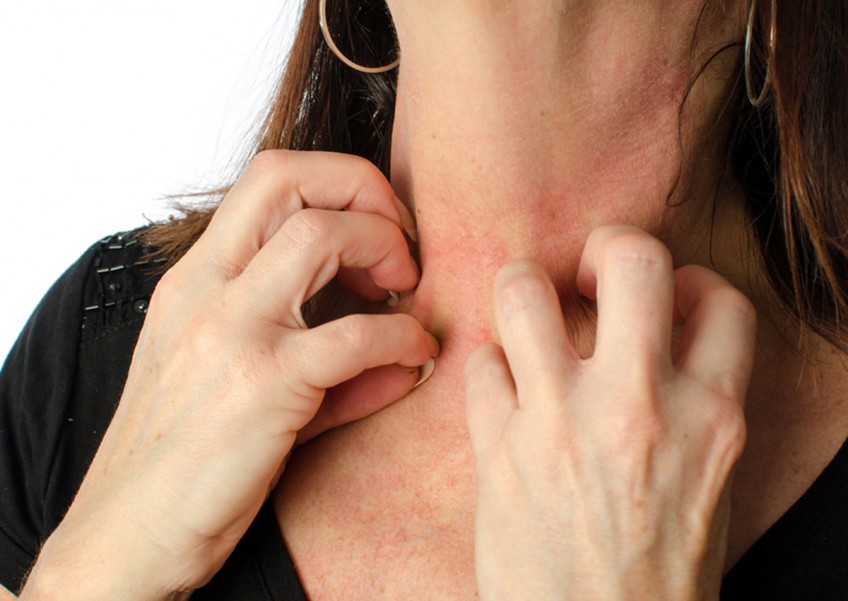8 ways to keep eczema under control

Eczema is a medical condition that makes your skin red, inflamed and itchy and also known as 'Atopic dermatitis'.
When I was studying abroad, my skin would get extremely dry whenever winter rolled in. And with super low temperatures, it became routine for me take a long hot shower after being in the freezing outdoors. Not long after, mild eczema symptoms appeared.
It began with dry skin and a mild itch over my elbow and leg but I neglected it as I thought it was the norm in winter.
As time passed by however, I noticed my affected skin started to form a demarcation zone and slowly skin discolouration occurred.
Turns out I had eczema. I didn't know then that my hot showers exacerbated the condition.
There are several ways to prevent eczema flare-ups and while they may not make it go away completely, these will help to keep it under control.
Here are a few of my tips on how to take charge of eczema.
Also read: More people diagnosed with eczema in Singapore
Moisturise your skin after a shower
Many aren't aware of how important it is to apply a body moisturizer, and the best time to do this is right after a shower when your skin is still damp. Pat your skin dry after your shower instead of rubbing your skin vigorously with a towel, as rubbing could inflame your pores and hair follicles. Apply your moisturizer right after. It is best to get a daily moisturiser that has no preservatives and is hypoallergenic for your skin type.
Drink lukewarm water to protect against skin infections
Make it a ritual to drink lukewarm water. The rule of drinking at least eight glasses of water daily has many health benefits, of which one is for healthy skin. Daily consumption of water keeps your skin cells rejuvenated and also aids in flushing out all the toxins from the body. To make drinking water more fun, you can add in lemon slices, berries or any other fruit to make flavour-infused water.
Keep your hands away from inflamed skin
Do not scratch the affected skin. The temptation is great to relieve the itch with a good scratch but this will just aggravate the condition further. The skin tends to get very itchy when it loses its moisture and natural oils, so remedying that will make the itch subside. I find that applying cold aloe vera gel helps to soothe the inflamed skin immediately.
Also read: 8 ways to help children with eczema reduce itchiness
Avoid air-conditioned rooms
Dermatologists have agreed that the air from air-conditioners is extremely drying for the skin. One study also showed that synthetic fibres blown through air-conditioning unite will also cause skin irritation. If you can, avoid staying and sleeping in air-conditioned rooms. If it can't be helped, then add some moisture to the air by placing a humidifier in the room.
Avoid the use of regular soap
If your skin is already dry and beginning to worsen. using harsh soap will only deteriorate your condition. Soap tends to wash away the residual moisture from your skin, making it dry and itchy. Use mild shower foam that has a pH level of 5.5 preferably and nothing lower than pH 4. You can also opt for special facial cleansers that are mild and designed especially for individuals with dry skin.
Also read: Are there ways to stop eczema flare-up?
Do not shower more than twice a day and keep it short
Yes, bathing too often is not good. Hitting the shower more than 2x a day increases the chance of drying out your skin. Keep in mind that you shouldn't take hot showers (lukewarm water is fine) and keep your showers to under 15 minutes. Long hot showers will only remove the natural oils of your skin; and if your fingers and toes start to get wrinkly then you've definitely been in the shower way too long.
Apply over-the-counter hydocortisone cream
Apply steroidal cream on your affected skin to relieve itch and inflamed skin but do not use it long-term. It is important to take medicines correctly as prescribed and, do not misuse the OTC cream. If your symptoms do not heal, please consult a doctor immediately.
Recognize your trigger factors
It is crucial to know what causes your skin to be inflamed from time to time. Some people are triggered by food allergens, dust mites, temperature, soaps or detergents and also clothing. Recognising your trigger factors can minimise flare-ups.